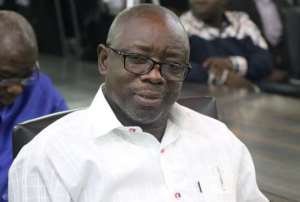
The success of Ghana's decentralisation efforts requires competent and efficient human resource capacity with an in-depth understanding of the legal framework and the various protocols governing the local government system.
That would certainly and eventually lead to improved service delivery at the regional and district levels to enhance the social and economic development of the populace.
Mr. Kwaku Asomah-Cheremeh, the Brong-Ahafo Regional Minister, stated in an address read on his behalf at the opening of a one-day sensitisation workshop on the Local Governance Act, 2016, Act 936 for Municipal/District Directors of Education, Health, Social Welfare and Community Development in the Region on Friday in Sunyani.
It was organised by the Institute of Local Government Studies (ILGS) with support from the Ministry of Local Government and Rural Development (MLGRD) and the Inter-Ministerial Coordinating Committee (IMCC).
It created a platform to sensitise the participants about the Act which has been promulgated to provide a framework for deepening Ghana's decentralisation endeavour in accordance with the 1992 Constitution.
The programme thus introduced them to the workings in the Local Governance legal regime as it relates to their respective duties and responsibilities to enable them to acquaint themselves with the Act to perform efficiently and effectively.
Mr. Asomah-Cheremeh noted Ghana had since 1988 implemented comprehensive local government and decentralisation reforms as a preferred development strategy, saying that the process was still on-going with significant success chalked including the consolidation of several Acts into the harmonized Act 936 of 2016.
He therefore lauded that the workshop was 'very timely and appropriate' because key personnel at national, regional and district levels must be exposed to new laws, trends and developments to position them conveniently to drive the decentralisation agenda.
Mr. Jonathan Azasoo, Deputy Director, National Development Planning Commission and a local governance expert gave highlights of the Act 936, 2016 and affirmed that it was a harmonization of previous Acts that were used in the decentralisation process.
He said those Acts were the Local Government Act 1993, Act 462, the Local Government Service Act 652, the District Assemblies Common Fund Act, the Planning System Act 480 and the Internal Audit Agency Act.
Mr. Azasoo said instead of totally supporting the decentralisation in the Assemblies, some of those Acts had some conflicting areas and inconsistencies.
He said the essence of the Act 936 therefore was to allow for efficient and effective local governance system without any inconsistency and discrepancy in the implementation and operational process by the Assemblies.
Mr. Felix Agyei Amakye, a lecturer at ILGS, stated that Heads of Departments were very important figures in the strategic development of the districts and with their professionalism and competencies, they could advise the district assemblies better.
He said being members of the District Planning Coordinating Units, they could bring their departmental plans to be part of the strategic development plans of the districts.
Mr. Amakye indicated that soon health and education would be well-integrated in the Municipalities/Districts and all departments would have to report to the Municipal/District Chief Executives (MDCEs) through the Municipal/District Coordinating Directors.
He urged the MDCEs to pay working visits to their departments, especially health and education to familiarise with their workings to have 'a strong bonding' for rapid and holistic socio-economic development of the Municipalities and Districts in the region. GNA
By Nana Osei Kyeretwie, GNA




 Meta releases new version of conversational AI across its platforms
Meta releases new version of conversational AI across its platforms
 Cape Town named Africa’s Best Airport 2024 by Skytrax
Cape Town named Africa’s Best Airport 2024 by Skytrax
 Bono East: Four injured after hearse transporting corpse crashes into a truck
Bono East: Four injured after hearse transporting corpse crashes into a truck
 ‘Be courageous, find your voice to defend our democracy’ — Sam Jonah urges journ...
‘Be courageous, find your voice to defend our democracy’ — Sam Jonah urges journ...
 Exodus of doctors, nurses and teachers have worsened because of unserious Akufo-...
Exodus of doctors, nurses and teachers have worsened because of unserious Akufo-...
 2024 election: Avoid insults, cutting down people in search of power – National ...
2024 election: Avoid insults, cutting down people in search of power – National ...
 ‘You passed through the back door but congratulations’ — Atubiga on Prof Jane Na...
‘You passed through the back door but congratulations’ — Atubiga on Prof Jane Na...
 Government’s $21.1 billion added to the stock of public debt has been spent judi...
Government’s $21.1 billion added to the stock of public debt has been spent judi...
 Akufo-Addo will soon relocate Mahama’s Ridge Hospital to Kumasi for recommission...
Akufo-Addo will soon relocate Mahama’s Ridge Hospital to Kumasi for recommission...
 We must not compromise on our defence of national interest; this is the time to ...
We must not compromise on our defence of national interest; this is the time to ...
